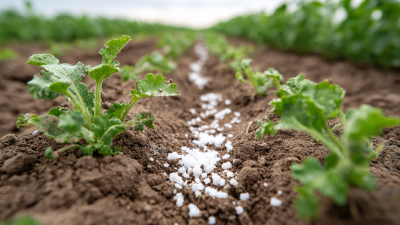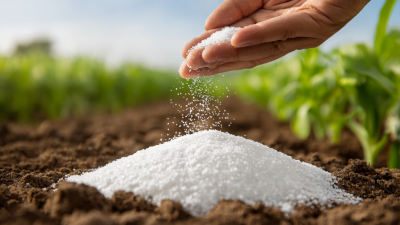In recent years, the agricultural industry has been increasingly focused on optimizing crop yields through innovative fertilization techniques. One such technique gaining traction is the use of Calcium Nitrate Boron Fertilizer, which integrates vital nutrients that promote plant growth and resilience. This type of fertilizer not only addresses common deficiencies but also enhances the overall physiological processes in crops, leading to improved quality and yield. Understanding the science behind Calcium Nitrate Boron Fertilizer is essential for farmers and agronomists alike, as it provides insights into how specific nutrient combinations can unlock the full potential of various plant species. In this guide, we will explore the mechanisms through which Calcium Nitrate Boron Fertilizer influences crop health and productivity, offering practical tips on its application in diverse agricultural settings.

Calcium nitrate boron fertilizer is a unique formulation designed to enhance plant health and boost crop yields. Comprising essential nutrients, this fertilizer combines calcium, nitrate, and boron to create a synergistic effect that supports various physiological processes in plants. Calcium is crucial for cell wall structure and stability, while nitrogen in the form of nitrate is vital for protein synthesis and overall plant growth. Boron plays a key role in reproductive processes, nutrient transport, and cell division, making it essential for the successful development of fruits and seeds.
The benefits of using calcium nitrate boron fertilizer extend beyond mere nutrient supply. By optimizing the nutrient availability for plants, it promotes stronger root systems and improves foliage health, leading to higher resistance against pests and diseases. Additionally, this fertilizer can enhance the efficiency of water uptake, resulting in improved drought tolerance.
As a result, farmers adopting this specialized fertilizer often witness significant increases in crop productivity, translating into higher yields and better-quality produce, ultimately supporting sustainable agricultural practices.
Calcium plays a pivotal role in enhancing crop resilience and growth, acting as a crucial nutrient that supports various physiological processes in plants. It is integral to cell wall development, influencing the structural integrity and stability of plant tissues. By facilitating the formation of calcium pectate, it ensures that cell walls remain firm and robust, which is essential for the overall health of the plant. Moreover, calcium helps mitigate stress responses by regulating cellular signaling pathways, enabling plants to cope more effectively with environmental stressors such as drought and salinity.
The incorporation of calcium nitrate boron fertilizer further amplifies these benefits, improving nutrient availability and uptake. Boron, in conjunction with calcium, enhances flowering and fruit set, leading to increased yields. The synergistic effect of these elements not only promotes growth but also contributes to the plant's ability to resist diseases and pests, thus ensuring better crop quality and resilience throughout the growing season. This combination creates a more sustainable approach to agriculture, as healthier plants are inherently more capable of withstanding adverse conditions, resulting in higher yields and reduced reliance on chemical interventions.
| Crop Type | Fertilizer Application (kg/ha) | Calcium Content (%) | Boron Content (%) | Average Yield Increase (%) | Resilience Index (1-10) |
|---|---|---|---|---|---|
| Tomatoes | 150 | 15.0 | 0.5 | 20 | 8 |
| Potatoes | 200 | 12.5 | 0.3 | 15 | 7 |
| Corn | 250 | 10.0 | 0.1 | 12 | 6 |
| Wheat | 180 | 14.0 | 0.4 | 18 | 7 |
| Rice | 220 | 11.0 | 0.2 | 22 | 9 |
Boron is a vital micronutrient that plays a crucial role in plant development, affecting various physiological and biochemical processes. It is essential for cell wall formation, as it helps stabilize pectin polymers, which are key components in maintaining structural integrity. Additionally, boron enhances the transportation of carbohydrates and reproductive processes, influencing flower and seed formation directly. This micronutrient is particularly important during the flowering stage of crops, where insufficient boron can lead to poor fruit set and reduced yield.
Moreover, the synergy between calcium, nitrate, and boron fertilizers significantly boosts overall plant health and productivity. Calcium nitrate provides essential calcium ions, promoting cell elongation and division, while nitrate serves as a vital nitrogen source for growth. When combined with boron, these nutrients can improve nutrient uptake and utilization efficiency, leading to stronger root systems and improved stress resilience. Consequently, farmers aiming to maximize crop yields must recognize the critical importance of boron in their fertilization strategies, ensuring that plants receive this vital micronutrient for optimal development.

 Calcium Nitrate Boron Fertilizer has emerged as a pivotal component in enhancing crop yields, supported by robust statistical evidence. This unique fertilizer not only provides essential nutrients but also aids in improving soil structure and moisture retention. Studies have shown that crops treated with Calcium Nitrate Boron exhibit increased growth rates and higher resistance to environmental stressors, leading to more abundant harvests. The statistical analysis highlights a significant correlation between the application of this fertilizer and increased productivity across various crops, making it a game changer for farmers looking to optimize their yield.
Calcium Nitrate Boron Fertilizer has emerged as a pivotal component in enhancing crop yields, supported by robust statistical evidence. This unique fertilizer not only provides essential nutrients but also aids in improving soil structure and moisture retention. Studies have shown that crops treated with Calcium Nitrate Boron exhibit increased growth rates and higher resistance to environmental stressors, leading to more abundant harvests. The statistical analysis highlights a significant correlation between the application of this fertilizer and increased productivity across various crops, making it a game changer for farmers looking to optimize their yield.
Tips: When applying Calcium Nitrate Boron Fertilizer, consider conducting a soil test to determine nutrient deficiencies. This will help tailor the application rate to your crops' specific needs. Additionally, timing is crucial; applying the fertilizer at key growth stages can maximize its benefits, ensuring that your crops receive the nutrients they require during critical periods of development.
Farmers should also be aware of the appropriate application methods. Foliar spraying can provide immediate nutrient uptake, while soil application leads to gradual release and sustained benefits. Monitoring crop responses post-application can yield insights that guide future fertilization strategies, optimizing both yield and efficiency in farming practices.
When it comes to maximizing crop yields, the strategic application of calcium nitrate boron (Ca(NO3)2·B) fertilizer plays a critical role. Research from the International Fertilizer Association indicates that the precise application of Ca(NO3)2·B can increase yield by up to 20% in select crops, particularly in environments where boron deficiency is prevalent. This compound not only supplies essential calcium for cell wall strength but also provides boron, which is vital for fruit development and seed formation.
Application strategies should be tailored to the specific needs of diverse crops. For instance, studies conducted by the American Society of Agronomy suggest that applying calcium nitrate boron at critical growth stages—such as flowering and fruit set—can significantly enhance nutrient uptake and improve overall plant resilience. Foliar applications have also shown promising results, yielding a 15% increase in quality for crops like tomatoes and peppers when applied at the right growth phase. Farmers are encouraged to conduct soil tests to determine nutrient status and adjust their fertilization strategies accordingly, ensuring optimal use of calcium nitrate boron for their specific crop types and local conditions.
This chart illustrates the effect of Calcium Nitrate Boron Fertilizer on the crop yields of various plants over a growing season. The data is based on average yield increases measured in tons per hectare.






